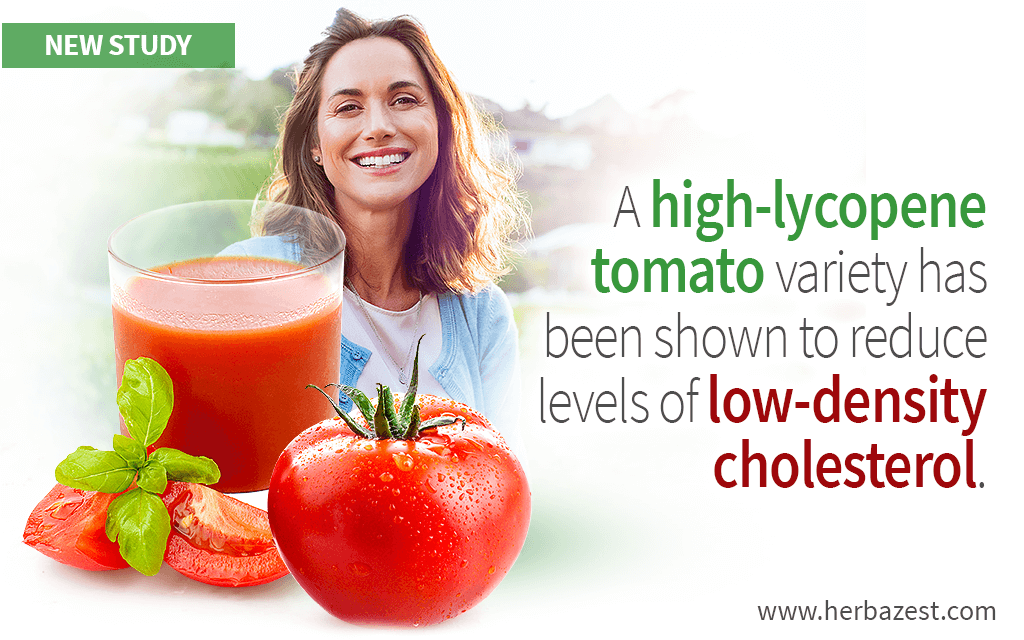Abnormal lipid levels, or dyslipidemia, are a growing health concern around the world. Its most common type is hyperlipidemia (high lipid levels), which is associated with major health risks.1 However, since lipid levels can be controlled with proper dietary practices, foods that can regulate the metabolism of fats are of high interest.
Tomato is an attractive candidate for functional food as it has been linked to numerous health benefits, such as strengthening the heart, protecting the skin, or preventing degenerative diseases.2 Previous studies (including a pilot trial by present researchers) have shown that lycopene, tomato's powerful antioxidant, can improve the lipid profile over the span of 8 weeks.3,4
Researchers in this trial intended to build on their previous findings and aimed to evaluate the effects of high-lycopene tomato on low-density lipoprotein (LDL) cholesterol levels with extended, 12-week consumption.
The Study
This 2019 randomized, double-blind, placebo-controlled study was conducted at Health Information Science Research Center of the Hokkaido Information University in Ebetsu, Hokkaido, Japan. The results were published in the Nutrients journal.
They recruited 74 Japanese participants with LDL cholesterol ranging from 120 to 160 mg/dL. For the purpose of this trial, a specific variety of high-lycopene tomato, called PR-7, was bred and utilized.
Participants, who were randomly assigned to two groups, either consumed 50 g of semi-dried (22% water content) PR-7 tomato with 22.0 - 27.8 mg of lycopene per day or a lycopene-free placebo tomato. The duration of the study was 12 weeks.
Numerous health parameters were measured before, during, and after the study, including vital signs, body composition, and blood and saliva samples.
The Results
The high-lycopene tomato group participants have shown significantly reduced levels of LDL cholesterol in comparison to the control group in 12 weeks.
Also, PR-7 tomato consumption resulted in higher levels of lycopene, thus confirming the causative relationship.
In terms of safety of daily high-lycopene tomato consumption, no major side effects were reported.
What Does this Mean?
The results of this study reaffirm the benefits of eating tomatoes for improving lipid metabolism. This offer tremendous help to those suffering from dyslipidemia as tomatoes are one of the most popular and inexpensive fruits, available virtually everywhere all year long, making them an ideal functional food.
This is also the first study that evaluates the effects of a semi-dried tomato on regulating lipid levels, which is the closest form to raw tomato (previous studies focused on other food preparations, such as a tomato juice). This is a significant advantage as lycopene absorption is affected by cooking.
Other herbs that might bring benefits to those wanting to improve their lipid metabolism are oats, apples, soy, and flax.
Sources
- Nutrients, Effect of 12-Week Daily Intake of the High-Lycopene Tomato (Solanum Lycopersicum), a Variety Named “PR-7”, on Lipid Metabolism: A Randomized, Double-Blind, Placebo-Controlled, Parallel-Group Study, 2019
Footnotes:
- American Heart Association. (2017). Prevention and Treatment of High Cholesterol (Hyperlipidemia). Retrieved December 11, 2019 from https://www.heart.org/en/health-topics/cholesterol/prevention-and-treatment-of-high-cholesterol-hyperlipidemia
- Mediators of Inflammation. (2014). Enhancing the Health-Promoting Effects of Tomato Fruit for Biofortified Food. Retrieved December 11, 2019 from https://www.ncbi.nlm.nih.gov/pmc/articles/PMC3972926/
- The Journal of Nutritional Biochemistry. (2013). Lycopene intervention reduces inflammation and improves HDL functionality in moderately overweight middle-aged individuals. Retrieved December 11, 2019 from https://www.sciencedirect.com/science/article/abs/pii/S095528631200099X
- Clinical Nutrition. (2015). Tomato juice consumption improves blood antioxidative biomarkers in overweight and obese females. Retrieved December 11, 2019 from https://www.sciencedirect.com/science/article/abs/pii/S0261561414002659





